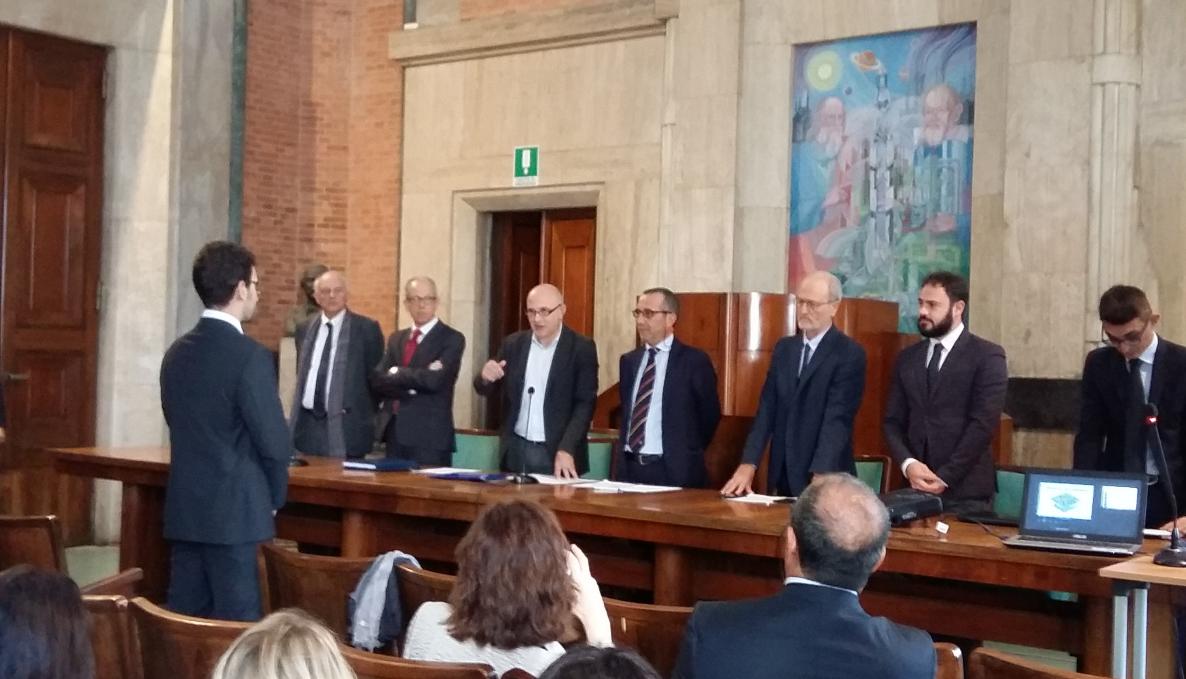A GRADUATE FROM SANT’ANNA SCHOOL AND UNIVERSITY OF PISA HAS BECOME THE FIRST PERSON IN ITALY TO RECEIVE A MASTER’S DEGREE IN BIONICS ENGINEERING

Born in Barletta in 1993, Francesco Lanotte received his master’s degree in Bionics Engineering at University of Pisa School of Engineering - Ulisse Dini auditorium, last Friday, October 13. Lanotte discussed his dissertation on the development of a control algorithm for a robotic exoskeleton designed to give lumbar support. After having successfully completed his two year course in “Bionics Engineering”, he graduated with honors and earned a joint degree. The program was launched in 2015 to increase cooperation between the University of Pisa and Sant’Anna School in a range of Engineering and Biomedical Engineering fields such as implantable bionics, orthopedic devices, medical instrumentation and prostheses.
Professor Paolo Maria Mancarella, rector of the University of Pisa and Professor Pierdomenico Perata, rector of Sant’Anna School, participated in the graduation ceremony. Mancarella commented the Master of Science in Bionics Engineering is the flagship program he personally designed to complement the body of knowledge of engineers working on engineering principles to bridge between mechanics and biology. Through the partnership of two leading higher education institutions in Pisa, Professor Perata said, the program has expanded the research topics such as the design of prosthetic limbs and neural control of muscles, and the specialized training in robot locomotion offered by the PhD Program in Biorobotics at Sant’Anna School which attracts many students every year. Professor Nicola Vitiello and Simona Crea, researchers at the Biorobotics Institute of Sant’Anna School, supervised Francesco Lanotte’s dissertation.
“Continuing changes in the engineering, medicine and biology sectors have increased the demand for Bionics Engineers. The Master Program in Bionics Engineering was created to prepare trained researchers to produce innovative soft robotics applications and wearable robotics for motor control rehabilitation and to reduce problems with the work environment” - said Luigi Landini, director of the program in Bionics Engineering.
“Francesco Lanotte is a talented student and a highly skilled engineer– said Nicola Vitiello, as his supervisor. He is pursuing the University of Pisa and Sant’Anna School goals through the exploration of nature and the use of engineering tools to better the quality of life. Our aim is to integrate human and robot into a single system to create useful devices and to make the human body stronger and more capable”.
Lanotte designed a comfortable exoskeleton for improving the ability of the worker to carry heavy loads. Creating sustainable working practices and environments is one the objectives of the European Commission; the progress made by enterprises and organizations in this direction can be consolidated through creating wearable bionic devices that adapt to our environments. Francesco Lanotte’s exoskeleton represents an impressive achievement which allowed him the opportunity to be enrolled in the doctoral program of the Biorobotics Institute.



